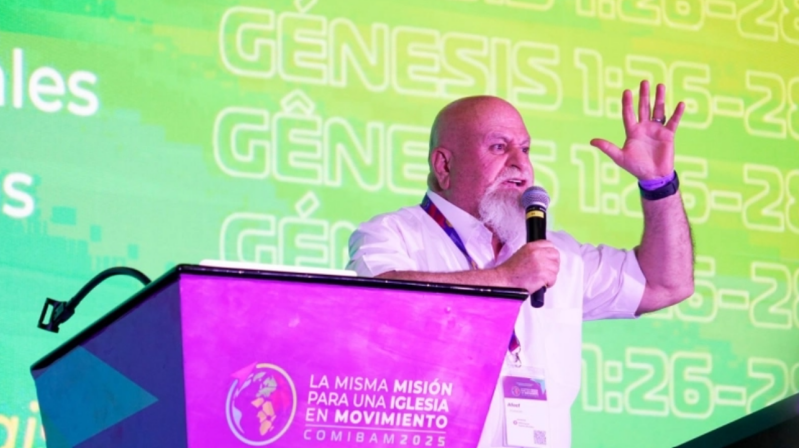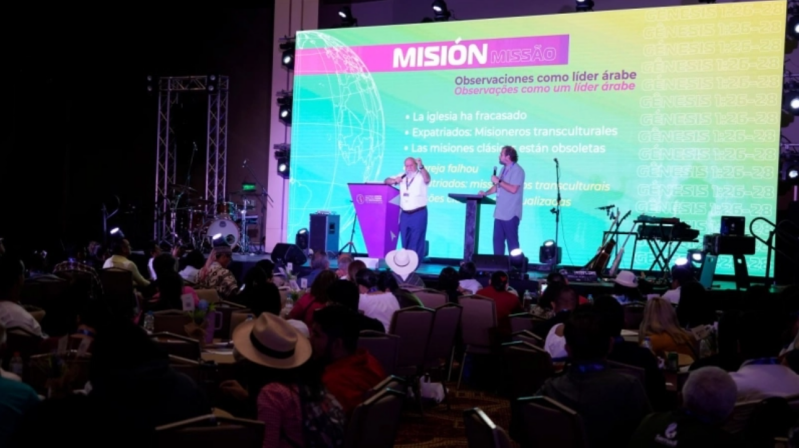
In one of the most challenging speeches at the COMIBAM 2025 Missionary Congress, Jordanian pastor Afeef Halasah, executive director of the Arabs for Arabs network (AFTA), church planter, and leader in the Middle East and North Africa, confronted Ibero-American leadership with a clear message: the church has lost its way and needs to recover its true identity and mission.
Based on Genesis 1:26-27, Halasah emphasized that the root of Christian mission is to bear the image and likeness of God. “I am not Jordanian, I am not just a pastor. I am the image and likeness of the Most High. I carry His DNA,” he said. According to Halasah, many believers have adopted multiple social, religious, or professional identities that have caused them to forget their true identity in God.
About the Middle East, he said: "It is a strategic region: the church was born there, and history will end there." However, more than 95% of the population is Muslim, not only ignorant of Jesus but openly opposed to Christianity.
The gospel of the Kingdom, not just salvation
One of Halasah's most provocative statements was his criticism of the reductionist theology in many evangelical churches: “Jesus did not preach only the gospel of salvation. He preached the gospel of the Kingdom. Being saved is only the prelude to the Kingdom. If we do not teach about the Kingdom, we raise superficial believers.”
Halasah also denounced the fact that many churches have adopted secular values and lost their transformative power.
“The church has become an NGO. We are not an organization, we are an ecclesia, the legislative body of the Kingdom. If the church is not the light, the darkness will be terrible,” he warned.
Halasah also criticized the leadership model that promotes corporate structures within the church: “Today, pastors are called CEOs. Jesus was not a CEO or an executive, he was a servant. True leadership is servant leadership.”
He urged pastors to “smell like sheep,” to live with their disciples, to teach by example, and to be spiritual parents, not just directors. “A good leader produces other leaders. And a good father is not jealous if his children surpass him. On the contrary, he celebrates it.”

A generational and reproducible vision
Halasah shared his experience planting more than a dozen churches in the Middle East. He said his goal is not to perpetuate his leadership but to train disciples who will surpass him: “I work to put myself out of a job. I train others, and then I go plant another church. That's how the Kingdom works.”
He criticized that many pastors only leave their churches when they die or fall into scandal. “That's not success. Success is leaving on your feet, leaving behind leaders who are more capable than you.” He called on leaders to prepare their disciples to begin their ministry from the heights they have reached.
The church as a movement, not an empire
Finally, Halasah called for abandoning the institutionalized church model that seeks to expand its denominational brand and returning to the biblical pattern of the church as a movement of the Kingdom.
“You were not called to a position; you were called to a mission. And if your church is not aligned with the mission of the Kingdom, you are building a monument to ego, not to God,” he said.
With applause and moved faces among the attendees, Halasah's message closed the third plenary session of COMIBAM 2025 with a profound challenge: to recover the mission, reclaim the identity, and restore the church's role as ambassador of the Kingdom of God on earth.
“God has put His image in us, like a manufacturer's logo on a device, guaranteeing that we will fulfill our function on earth,” he explained. He affirmed that Christians should reflect God's characteristics in their lifestyle and that the Kingdom of Heaven is a true reality, with a King and a Constitution: the Bible.
A young and needy Arab world
Halasah also provided an overview of the Middle East and North Africa: 22 Arabic-speaking countries, with more than 456 million people, the majority of whom are under the age of 25.
Originally published by Diario Cristiano, Christian Daily International's Spanish edition.





